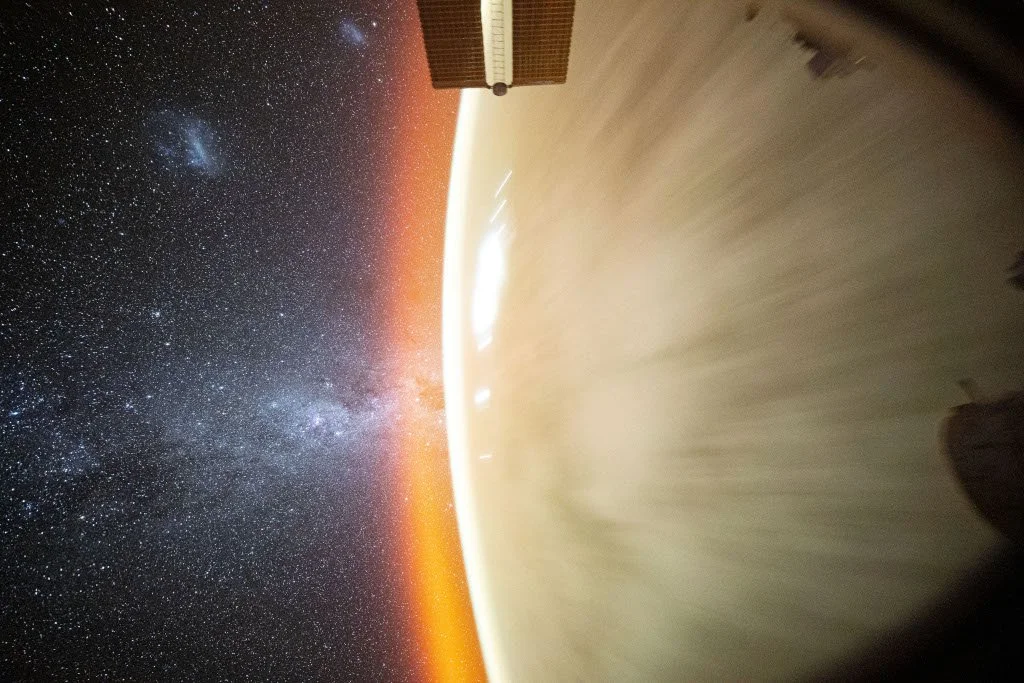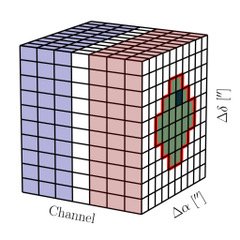
News

Our Fall CosmicAI seminar series will kick off Sept 3!
Time: Noon Eastern / 11am Central / 10am Mountain alternating Wednesdays, beginning September 3rd!
Location: Online & in-person at the rotating partner institutions.
Theme: AI+ data processing and preparation!
Hosts: UVA+NRAO
This semester our hybrid CosmicAI seminars will be jointly hosted by UVA and NRAO. There will be general theme of AI+observational data, with a particular focus on radio and spectral data. The talks will progress with more introductory topics at the beginning of the semester; these are intended to be accessible to non-experts in AI and Astro. Two of the seminars will be guest-hosted in-person at UT and Utah.
Lead organizers: Eric Murphy + Paul Torrey
Check out our events page for details on each seminar!

Vote to help CosmicAI bring AI + Astronomy to the SXSW stage!

Inaugural Cosmic Horizons Conference Unites Astronomers and AI Experts
In early May, NSF-Simons AI Institute for Cosmic Origins (CosmicAI) brought together leading voices in astronomy and artificial intelligence (AI) for the 2025 Cosmic Horizons Conference, a three-day event held May 6-8, 2025, at the University of Texas at Austin. The conference explored the rapidly evolving intersection of artificial intelligence, machine learning, and astronomy research. Conference sponsors included the National Science Foundation (NSF), Simons Foundation, and the Oden Institute for Computational Engineering and Sciences. Astronomers and AI researchers presented their work to a broad range of attendees, which included faculty, students and industry professionals from across 40 different institutions. More than 40 presentations provided a platform for interdisciplinary dialogue, learning from one another’s methods, challenges, and perspectives across both domains.
As Alessandra Corsi, W. H. Miller professor in the Department of Physics and Astronomy at Johns Hopkins University, noted during an interview, “We are at a very exciting time – when we are starting to see a trickle of multi-messenger discoveries, but we think that over the next decade, we’re going to see a flood. Astronomers on their own don’t have the tools to really capitalize on this. Talking to people who are experts in data science and AI and bringing people together in a conference like this can really enable us to make the next big leap in multi-messenger astrophysics.”
Presenters shared research on using machine learning to study galaxies, dark matter, gravitational waves, and the structure of the cosmos. Several projects focused on building better AI tools, running simulations to speed up discovery, and using AI to make sense of large astronomical datasets. Other presentations focused on how to make AI systems more transparent and trustworthy for scientists. From understanding the life cycle of stars to spotting strange or unexpected patterns in space, the presentations showed the wide range AI is being used in the field of astronomy.
The conference centered on three core themes: advancing scientific discovery through AI, building trustworthy and interpretable AI tools, and preparing for the big-data era in astronomy. Speaking to the importance of transparency and trust, Aimee Lee Schechter, PhD Candidate at the University of Colorado Boulder, noted, “I think the more the scientific community can show in their work why we trust these models, the more it will help us understand the place that AI can have productively in our society overall.”
To support the next generation of researchers and leaders, a panel explored career-building strategies, networking and opportunity development. The panel was led by Kevin Gullikson, Machine Learning Researcher at Trase, Randi Ludwig, professor at UT Austin, Tanmoy Laskar, assistant professor of Physics and Astronomy at the University of Utah, and Eric Murphy, Astronomer at the National Radio Astronomy Observatory (NRAO). During the panel, they expanded on the pros and cons of various professional pathways, and gave personal insights and experiences to help emerging scientists navigate in rapidly evolving fields.
Murphy underscored the unifying power of astronomy, saying, “What astronomers do in general, by studying our place in the universe, is important to humanity because it is something that really links all of us - independent of your culture, religion, or what your day-to-day life is like. We all live on the same planet, and we’re all interested to understand how we got here and why we are here.” CosmicAI aims to host an Astro-AI meeting every year of its 5-year mission.
A full list of conference speakers and panelists can be viewed here.

CosmicAI 2025 Seed Funding Announcement
We’re excited to announce the recipients of our CosmicAI Seed Funding Awards for 2025. We are proud to welcome them to the growing CosmicAI community. We’re honored to support their work and look forward to seeing them take the next leap forward in furthering our understanding of the cosmos.

Six Months of CosmicAI: A Look Back and Ahead with CosmicAI PI and Director, Dr. Stella Offner
Dr. Stella Offner delivers a talk marking CosmicAI’s six-month anniversary, reflecting on our progress to date and the path ahead. She shares the vision that inspired our founding and outlines our mission: to harness AI in transforming how we analyze astronomical data, observe the universe, and accelerate the scientific process.
In the talk, Dr. Offner highlights our core focus areas—developing trustworthy and efficient AI tools, improving interpretability, and building infrastructure to support open, collaborative science.
She also reviews key milestones from our first six months, including early-stage research efforts, community engagement, and educational programs designed to build AI literacy within the astronomy community. Looking forward, she discusses plans to expand interdisciplinary training and foster broader understanding of AI’s role in enabling discovery.
Dr. Offner closes by surveying the current landscape of AI in astronomy and outlining CosmicAI’s ongoing efforts to secure funding, grow partnerships, and support advocacy and educational initiatives that promote the responsible and impactful use of AI in the field.
Link to presentation here

Empowering Educators: CosmicAI and UVA Host Teacher Training Workshop on AI in the Classroom
Last weekend, 38 educators from across Virginia gathered at the University of Virginia for a teacher training workshop on AI in primary education, co-hosted by CosmicAI and the UVA Center for the Liberal Arts. As artificial intelligence rapidly reshapes education, the workshop aimed to provide teachers with the tools and knowledge to integrate AI into their classrooms effectively and responsibly.
The event covered key topics including:
How generative AI works and its evolving role in education.
Creative applications of AI in student learning.
Strategies to maintain academic integrity.
Paul Torrey, Co-PI of CosmicAI and a UVA faculty member, led sessions introducing foundational AI concepts. The workshop also featured contributions from leading experts in education:
Natasha Heny (Associate Professor of Education, UVA) led interactive sessions on LLM-augmented instructional design, helping teachers explore how AI can support curriculum development and student engagement.
Dana Little (Assistant Professor of English, UVA) guided discussions on the potential of multimodal AI-generated content to enhance accessibility and support diverse learning styles.
Alecia Blackwood (Assistant Professor of Education, Longwood University) provided an overview of AI educational tools, addressing privacy concerns and navigating school district adaptation policies.
Teachers engaged in hands-on activities and collaborative discussions, leaving with practical strategies to bring AI-based learning into their classrooms.
As AI continues to shape the future of education, CosmicAI remains committed to bridging the gap between cutting-edge AI research and real-world classroom applications. Stay tuned for future workshops and resources to support educators in this rapidly evolving landscape!
Sign up to learn more about our initiatives at https://www.cosmicai.org/get-involved

CosmicAI’s Response to Federal RFI on AI Policy Ideas

Call for Seed Funding Proposals
NSF-Simons AI Institute for Cosmic Origins (CosmicAI) invites the submission of proposals for novel research projects at the intersection of AI/machine learning and astronomy.
Explorable Universe: Advancing trustworthiness, generative AI methods, and exploration of large datasets.
Observable Universe: Advancing the efficiency of the calibration and analysis of high-dimensional data and preparation for next-generation observing facilities.
Explainable Universe: Advancing the interpretabililty of AI methods and their application to study astrophysical systems.
Accelerated Universe: Advancing the robustness of AI surrogate modeling in the astrophysical domain and methods to accelerate the modeling of physical processes
Applications will be reviewed in two stages. Applicants will first submit a project abstract. Abstracts will be reviewed by March 21. Selected applications will be invited to submit a full proposal. Final awards will be announced by May 1.
Abstract Submission: Due March 14

Video: CosmicAI: Revolutionizing Astronomy with Artificial Intelligence
An interview with Professor Stella Offner, an astrophysicist and the visionary Director of the CosmicAI initiative on the OpenAI Changes Everything podcast.
Her groundbreaking work leverages AI to unravel the mysteries of the universe’s formation, pushing the boundaries of how we explore the stars. Professor Offner shares her fascinating perspective: while AI, when used as a tool by human scientists, is accelerating scientific discovery in ways we never imagined, it’s not set to replace human scientists anytime soon.

AI Meets the Cosmos: Astronomers’ Ambitious Plan to Tackle Astronomical Big Data

NSF & Simons Foundation To Fund Two AI Research Institutes For Astronomy

What Could AI Do for Scientific Research?

NRAO Part of New AI Institutes Launched by U.S. National Science Foundation and Simons Foundation

UVA to Co-Host AI-Powered Astronomy Institute

UCLA Contributes to NSF-Simons AI Institute for Cosmic Origins with Advanced Machine Learning Research

U Researchers Join New NSF-Simons CosmicAI Institute

2024 State of the University of Texas at Austin Address

New AI Institute Led by University of Texas Researchers Will Accelerate Cosmic Discovery

NSF and Simons Foundation launch 2 AI Institutes
Researchers will build a new breed of AI-powered tools to find the needles of discovery lurking in vast haystacks of astronomical data.